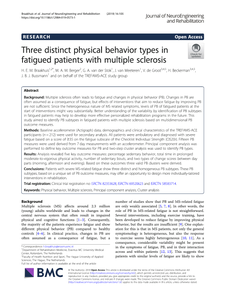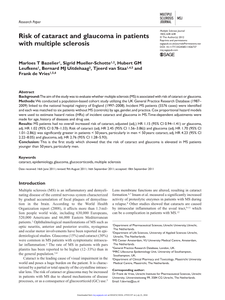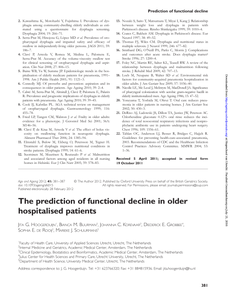Background: Multiple sclerosis often leads to fatigue and changes in physical behavior (PB). Changes in PB are often assumed as a consequence of fatigue, but effects of interventions that aim to reduce fatigue by improving PB are not sufficient. Since the heterogeneous nature of MS related symptoms, levels of PB of fatigued patients at the start of interventions might vary substantially. Better understanding of the variability by identification of PB subtypes in fatigued patients may help to develop more effective personalized rehabilitation programs in the future. This study aimed to identify PB subtypes in fatigued patients with multiple sclerosis based on multidimensional PB outcome measures. Methods: Baseline accelerometer (Actigraph) data, demographics and clinical characteristics of the TREFAMS-ACE participants (n = 212) were used for secondary analysis. All patients were ambulatory and diagnosed with severe fatigue based on a score of ≥35 on the fatigue subscale of the Checklist Individual Strength (CIS20r). Fifteen PB measures were used derived from 7 day measurements with an accelerometer. Principal component analysis was performed to define key outcome measures for PB and two-step cluster analysis was used to identify PB types. Results: Analysis revealed five key outcome measures: percentage sedentary behavior, total time in prolonged moderate-to-vigorous physical activity, number of sedentary bouts, and two types of change scores between day parts (morning, afternoon and evening). Based on these outcomes three valid PB clusters were derived. Conclusions: Patients with severe MS-related fatigue show three distinct and homogeneous PB subtypes. These PB subtypes, based on a unique set of PB outcome measures, may offer an opportunity to design more individually-tailored interventions in rehabilitation.
MULTIFILE

The aim of the study was to evaluate whether multiple sclerosis (MS) is associated with risk of cataract or glaucoma. We conducted a population-based cohort study utilizing the UK General Practice Research Database (1987–2009) linked to the national hospital registry of England (1997–2008). Incident MS patients (5576 cases) were identified and each was matched to six patients without MS (controls) by age, gender, and practice. Cox proportional hazard models were used to estimate hazard ratios (HRs) of incident cataract and glaucoma in MS. Time-dependent adjustments were made for age, history of diseases and drug use.
DOCUMENT

Autoimmune antibody profiling plays a prominent role in both classification and prognosis of systemic sclerosis (SSc). In the last years novel autoantibodies have been discovered and have become available in diagnostic assays. However, standardization in autoimmune serology is lacking, which may have a negative impact on the added value of autoantibodies in diagnosis and prognosis of SSc. In this paper we describe the comparison of commercially available diagnostic assays for the detection of SSc-associated autoantibodies and explored the coexistence of multiple SSc-associated autoantibodies within patients.
LINK
Systemic sclerosis (SSc) is an autoimmune disease which is characterized by vasculopathy, tissue fibrosis and activation of the innate and adaptive immune system. Clinical features of the disease consists of skin thickening and internal organ involvement. Due to the heterogeneous nature of the disease it is difficult to predict disease progression and complications. Despite the discovery of novel autoantibodies associated with SSc, there is an unmet need for biomarkers for diagnosis, disease progression and response to treatment. To date, the use of single (surrogate) biomarkers for these purposes has been unsuccessful. Combining multiple biomarkers in to predictive panels or ultimately algorithms could be more precise. Given the limited therapeutic options and poor prognosis of many SSc patients, a better understanding of the immune-pathofysiological profiles might aid to an adjusted therapeutic approach. Therefore, we set out to explore immunological fingerprints in various clinically defined forms of SSc. We used multilayer profiling to identify unique immune profiles underlying distinct autoantibody signatures. These immune profiles could fill the unmet need for prognosis and response to therapy in SSc. Here, we present 3 pathophysiological fingerprints in SSc based on the expression of circulating antibodies, vascular markers and immunomodulatory mediators.
DOCUMENT
No summary available
DOCUMENT
Background: Parents of children with profound intellectual and multiple disabilities (PIMD) have extensive care duties. This study describes the phenomenon “parenting a child with PIMD.” Method: We conducted in-depth interviews with 25 Dutch parents. A reflective lifeworld research. Findings: The essential meaning of the phenomenon was understood as “continuously struggling to create and maintain new equilibriums that protect the child and the family from hardship; changing in context through time.” The following eight constituents were identified: (1) medical complexity; (2) multidimensional weariness; (3) care for siblings; (4) social connectedness; (5) uncertainty about the future; (6) wrecking bureaucracy; (7) dependency on healthcare delivery; and (8) financial concerns. Conclusions: Healthcare services should provide families with easy access to assistive technology and services needed to manage family life. Responsiveness to parents’ challenges offers them the possibility to participate in society. Healthcare professionals should address the parents’ perspectives related to the child’s quality of life.
DOCUMENT

In the Netherlands, many parents of children with profound intellectual and multiple disabilities care for their children at home. Little is known about how parents and involved healthcare professionals share and align medical care for these children. This study aims to contribute to a better understanding of the dimensions that affect how medical care is shared and how healthcare professionals can align care with family needs. The study design was inspired by grounded theory. We analyzed in-depth interviews with 25 Dutch parents. The analysis identified five dimensions affecting how parents and professionals shared and aligned medical care: fragility, planned care, irregularities, interactions with providers, and parents’ choices. We recognized three distinctive ways these dimensions interplayed, characterizing scenarios of sharing care: dependent care, dialogical care, and autonomous care. The findings illuminated that parental distress decreased when parents could communicate about what they considered important for their child and family and its implications for sharing care. Parents developed their capacity to manage medical care and often evolved in their thinking about the quality of care and life. Sometimes this evolution was due to struggles with the care provided by professionals. Therefore, healthcare professionals may need to broaden the relational work of shared decision-making to include the sharing of medical care. Arrangements need to be continually reassessed as changes in the child’s and family’s situation trigger changes in preferred patterns of sharing care. Commitment to parents’ autonomy implies that healthcare professionals should be attentive to the parents’ emotional and relational needs.
MULTIFILE

Background Parenting a child with profound intellectual and multiple disabilities has great implications. Parents generally rely heavily on healthcare and social welfare services in caring for the child at home. Previous studies indicated mismatch between what parents need to preserve family and personal wellbeing and what is typically provided by services. This study focused on the role of healthcare and social welfare services in childcare and aims to contribute to understanding how parents perceive their interactions with service providers. Methods We interviewed 25 Dutch parents who cared for their child at home. Data were analysed using Framework Method. Findings Two overarching themes were found: “Being the lifeline” addressed that parents had central roles in fragmented services, and “Losing ownership” highlighted that parents were constrained in living life according to own beliefs and values while interacting with providers. Conclusions Findings illuminated that many parents became overburdened and compromised heavily on agency over family thriving due to functioning of healthcare and social welfare services. Findings supported working with integrated family case managers, creating effective and proactive access to equipment and services, and enacting high quality facilities for help with childcare and respite. These are important conditions to enable parents to construct family life more autonomously and make their further contribution to society. This may also lead to improved connotations of dependence on healthcare and social welfare services.
MULTIFILE

Thirty to sixty per cent of older patients experience functional decline after hospitalisation, associated with an increase in dependence, readmission, nursing home placement and mortality. First step in prevention is the identification of patients at risk. The objective of this study is to develop and validate a prediction model to assess the risk of functional decline in older hospitalised patients.
DOCUMENT

Aims and objectives. To compare a functioning assessment based on the International Classification of Functioning, Disabilityand Health (ICF) with a conventional medical assessment, in terms of their respective consequences for health professionals’clinical decision-making and the fit with patient’s own perspective of health.Background. In chronic diseases, pathogenic-oriented health care falls short in generating all the information required fordetermining healthcare provision to improve health. A broader, so-called salutogenic approach, by using the ICF, focusingon how to stay healthy, rather than on what causes diseases, seems more appropriate.Design. A cross-sectional comparative study using data from a randomised controlled trial.Methods. Data about patient problems and professional healthcare activities were collected from a total of 81 patients withsevere multiple sclerosis who were randomly assigned to one of two groups: the ICF group, assessed with a functioningassessment (n = 43), and the medical group, assessed with a conventional medical assessment (n = 38). Data were analysedstatistically using descriptive and inferential statistics.Results. A functioning assessment resulted in the registration of significantly more patient problems in the health components‘participation’ and ‘environmental factors’, as well as significantly more professional healthcare activities befitting thesecomponents. The ICF group had a significant positive correlation between registered problems by health professionals andpatients’ self-reported problems, whereas the medical group had several negative correlations.Conclusion. A functioning assessment resulted in a care plan that not only was broader and more complete but also reflectedthe patients’ self-reported problems more closely than a medical assessment, without a loss of focus on medical problems.Relevance to clinical practice. This study has shown that some health problems remain unnoticed by a medical assessmentalone, which is especially important for the chronically ill. A functioning assessment provides a strong foundation for identifyingall relevant information related to health.
DOCUMENT